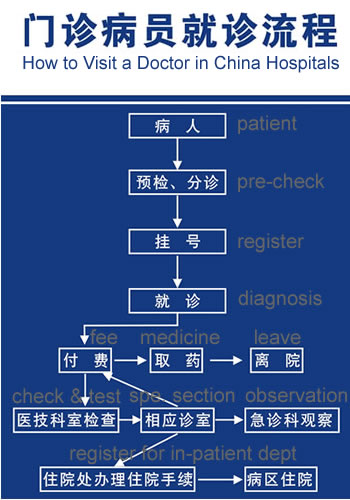How to See A Doctor in China
It is never nice to fall sick or ill in a strange country. What happens if you do and need to seek medical help? Let us provide you with some useful medical advice and tips and how
to seek medical help or assistance in China.
The Chinese medical system comprises mostly of public and private hospitals. Small and personalized clinics are still uncommon. Big cities in China like Beijing and Shanghai have hospitals, clinics and dentists
established for foreigners.
Many of them are a part of local hospitals. Most hospitals in China practice the Western
medical treatment system while a good percentage practice Traditional Chinese medicine (TCM). Increasingly, a large percentage of hospitals also practice a mixture of Western and
Chinese medicine. Some can offer a full range of medical services such as operations, check-ups and in-patient facilities while other smaller clinics may simply be able to diagnose the symptoms of minor ailments.

Common procedures to visit a doctor in China’s hospitals
The first thing you should know about local medical services is the emergency call number 120. You can dial 120 from anywhere. An ambulance will normally arrive in a few minutes
but traffic conditions can cause delays.
Most Chinese will visit a local hospital. If your company doesn’t cover medical expenses or
you can’t find a Western clinic because you are in a much smaller town, you can also try visiting a local Chinese hospital. If you wish to do what Chinese do, and you’ve decided to
see a doctor in a local public hospital, you should have an interpreter accompany you as
most of the doctors and nurses don’t speak English fluently. You should have some basic knowledge such as the procedures (please read the English-Chinese chart on how to visit
a doctor in China hospitals) and some useful Chinese medical phrases. Treatment are mostly Western medical techniques including diagnosis, medication, injection or the necessary scans. However, medications can be a mixture of Western and Chinese drugs.
Your doctor may give you a prescription for you to buy
medicine in a drugstore, most of the time at the lobby of the out-patient section building. Go to a drugstore, show the chemist the prescription and you’ll be given what you need. Medicines in independent drugstores are often cheaper than those in hospital pharmacies.
Cultural shock
Chinese medical care system is improving all the time, but if you need to visit a doctor in a local hospital, especially in a small city, do be prepared for some cultural shock. Local hospitals are still pretty poor in the area of personal privacy and so do not be surprised if you share a consulting room with more than one patient.
If you need to be hospitalized, you may be shocked by the low hygiene standard practiced
in the smaller hospitals and privacy is always a problem as you are likely to share a ward
with a few other patients. Visiting hours tend not to be observed and some patients has many visitors that may turned a shared ward into a noisy room. You may find such lapse of privacy a major irritant.
Chinese health belief
Chinese believe in the adage that prevention is always better than cure. Hence, it is very common to see Chinese practice Qi-Gong or Tai-Chi (forms of Chinese martial arts) in
parks and gardens to achieve good internal health and strength.
If you do not have time to pick up such skills, the Chinese always believe that Tui-Na (推拿
a form of Chinese massage) and reflexology (足疗Foot massage) can go a long way
towards maintaining good health. The Chinese has a long tradition for Chinese Kung Fu or martial arts. Training injuries are very common and herbal plasters and ointments to treat
pain and ache are very popular and effective.
Common health tips when travelling to China
The best method to avoid seeing a doctor is not to fall ill.
— Bring some common medicines you use at home and keep them in your bag just for emergency.
— When travelling, get plenty of rest and sleep.
— Drink plenty of fluid, but in China, try to avoid drinking directly from the water tap. Drink from bottled drinks and always boil the water if your only choice is the tap.
— Always eat in a restaurant that has plenty of customers. Avoid restaurants that do not have customers and certainly avoid street stalls.
